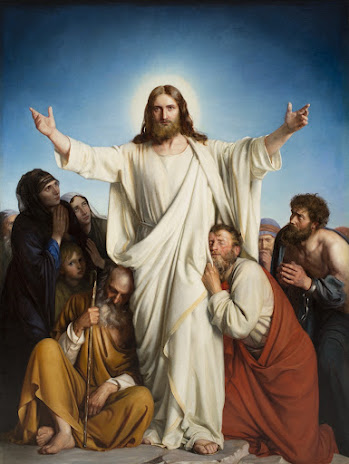Mary set out
and traveled to the hill country in haste
to a town of Judah,
where she entered the house of Zechariah
and greeted Elizabeth.
The response of Mary to the gift of the conception of her son was immediate and powerful. There was no inertia to slow her down as there often is for us sinners. When Jesus is born into the hearts of Christians there is still the reality of concupiscence preventing us to one degree or another from being all in and going all out in response. By the grace of God the gift of Jesus does nevertheless make a huge difference in our lives. And his grace makes some conversions seem as profound as the difference between night and day. But most of us, even in our Christian lives, sometimes experience the presence of Christ in our lives as a burden and a difficulty. Rather than sending us outward in service as it did for Mary, it draws us inward with paralyzing introspection. We think of the difficulties the Christian path presents us, and do not feel equipped to do much more than stay home and do the bare minimum. Mary is more than just a contrast by which we can see how far short we fall. She is actually the key to learning the enthusiasm and motivation that we are all meant to have.
When Elizabeth heard Mary’s greeting,
the infant leaped in her womb,
and Elizabeth, filled with the Holy Spirit,
cried out in a loud voice and said,
“Most blessed are you among women,
and blessed is the fruit of your womb.
When we are attentive to Mary we are made aware of the joy that the presence of Jesus brings. Wherever she went people like Elizabeth were filled with the Holy Spirit. Just as for Elizabeth, so too was Mary present for the decent of the Holy Spirit at Pentecost. She was, as it were, a kind of lightning rod for the Spirit. Elizabeth did, and people of all generations would, call Mary blessed because Mary helped them to experience the presence of her son. Elizabeth was almost overwhelmed that Mary, the new ark of the covenant, could bring the presence of God specifically to her in this way. But during their earthly lives Mary never attempted to keep Jesus for herself, but contributed as she was able, to helping him be known to others. As with Elizabeth, and Simeon, and the people at the wedding in Cana, so too does she want us to realize the joy that she herself first experienced in the gift of Jesus. As she was given to the beloved disciple to be his mother, so too does she want to be a mother to all who keep the commandments of her son, and to help give birth to the image of Jesus in us. To do so is a great joy for her, like the joy she shared with Elizabeth. And if we open ourselves to her, and to the presence of him whom she brings to us, it will be joy for us as well.
Shout for joy, O daughter Zion!
Sing joyfully, O Israel!
Mary, as a living embodiment of daughter Zion, did break forth into the song of the Magnificat. But this song was not for the purpose of bragging, but rather to inspire us to join her, to share her joy in singing. God has looked on our lowliness as well, giving Jesus to us as he did first to her. This means that we too have the only blessedness that will stand the test of time. Mary was someone that understood that the hiddenness and apparent smallness of the presence of God concealed the greatness and the power of what he was accomplishing in the world, the great reversal he was bringing about. He was even then exulting the lowly and scattering the proud. Mary and Elizabeth were already experiencing such exultation, whereas those proud rulers of this world were nowhere to be found. In our own world, where it often seems that the powers of darkness are ascendant we need to remember that the victory of God, if hidden, is nevertheless present and real.
From Mary's presence we learn that the Lord "has removed the judgment again" us. This is proven by the fact that the "King of Israel, the LORD, is in your midst" and so "you have no further misfortune to fear". We begin to understand from Mary, the human being most transparent to the heart of God, that her own song of joy was only a response to God's song of joy over us.
He will rejoice over you with gladness,
and renew you in his love,
He will sing joyfully because of you,
as one sings at festivals.
John Michael Talbot - Holy Is His Name















